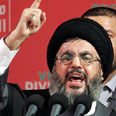
Hassan Nasrallah
Photo: AP

Ehud Olmert
Photo: Dudi Vaaknin
"Prime Minister Ehud Olmert admitted that it was decided to open the July war (Hizbullah's term for the second war between Israel and Lebanon) four months before the operation to kidnap the two Israeli soldiers," intoned the anchor of al-Manar's evening news on Thursday.
MKs Criticize Olmert
Amnon Meranda
MKs criticize PM's statement that second Lebanon war was planned months in advance, a claim Nasrallah made repeatedly during war. 'If he isn't lying – it's a thousand times worse,' says MK Eldad
As was largely expected, Hizbullah officials seized on reports published by Ha'aretz according to which Olmert told the Winograd Commission that he decided to launch a military operation in case of a kidnapping incident along the Lebanese border as early as March, 2006, four months prior to the beginning of the war in Lebanon.
All throughout the war and afterwards, Hizbullah's leader Hassan Nasrallah defended himself from internal Lebanese criticism by claiming that Israel had already been planning the war and that it "exploited" the abduction of Ehud Goldwasser and Eldad Regev to go to war, therefore trying to paint Hizbullah as a victim of circumstance.
Experts estimate that Nasrallah will find it difficult to stay away and may emerge from his hiding place to grant a television interview to say: "I told you so."
With his organization in the midst of political turmoil at home in Lebanon, a political crisis Nasrallah himself initiated by camping out thousands of Hizbullah supporters next to the government's residence in Beirut, and the scales beginning to tip against him, it was clear Hizbullah would be quick to jump on the reports from Israel.
Tying in Olmert's statements to its campaign against the sitting government, Hizbullah also pointed a finger against the Lebanese coalition who they claim "aided Israel during the war."
"The question is who was party to this conspiracy besides Olmert," said Hizbullah MP Mohammed Fneish in an interview to al-Manar, which is owned by Hizbullah.
The report from Israel could give a much-needed boost to Hizbullah which is loosing power, especially in southern Lebanon. Nasrallah's bank credit is no longer bottomless, to say the least. Iran, long since Hizbullah's chief benefactor, has financial difficulties of its own and on Thursday morning it was reported that its government intends to subsidize gasoline to deal with the impending economic sanctions it faces.
But in Lebanon as in Lebanon, those who support Nasrallah believed him anyways and those who oppose Nasrallah will not pay much attention to his claims. Despite the return to his victory rhetoric we are likely to hear from him again soon; Nasrallah will apparently have to pull out a slightly more creative rabbit from his hat to untangle himself from his difficulties.















